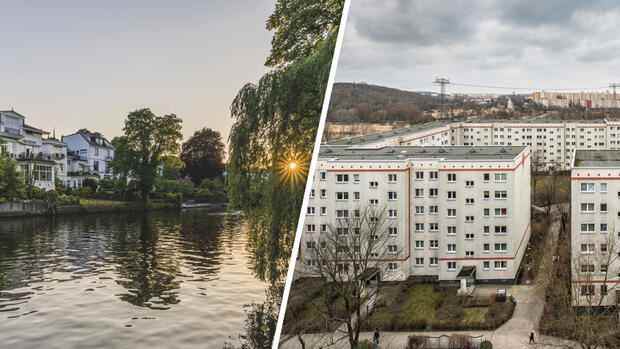When the economy is in crisis, inequality decreases. In the upswing, however, the unequal distribution of income increases.
(Photo: imago / Westend61, Gerhard Westrich / laif)
Berlin The German economy is slowly getting going again. What is basically good news, however, means the opposite for income inequality in Germany.
This is shown by a new study by the German Institute for Economic Research (DIW). For the first time in Germany, the researchers examined the relationships between the economic situation and the distribution of income.
The result for the past 40 years: If the economy is in crisis, inequality will decrease. In the upswing, however, the unequal distribution of income increases.
Both the comparison of the poorest with the richest ten percent of the population and the analysis of the Gini coefficient confirm the finding. The Gini coefficient is the best known measure of inequality and relates the income of the entire population.
Top jobs of the day
Find the best jobs now and
be notified by email.
The more unequal the income distribution, the higher the coefficient. According to the study, the Gini coefficient falls by 0.4 percentage points per year in economic crises, and increases by 0.15 percentage points per year in phases of recovery.
Particular attention should be paid to poor people in the upswing
This was particularly evident during the corona pandemic. In the crisis year 2020, the Gini coefficient even fell by one percentage point. “But that just means that inequality is likely to rise all the more during the upswing,” warns Geraldine Dany-Knedlik, who carried out the DIW study together with Alexander Kriwoluzky.
The results of the study should fuel the current discussion about the extension of the corona aid. The subsidies for companies, the simplified access to short-time working allowance and other measures expire at the end of the year. But the currently increasing number of infections are now making calls for an extension of the aid to be loud.
The Federal Ministry of Labor has already proposed extending the short-time allowance by a further three months. Minister of Economic Affairs Peter Altmaier and his country colleagues agree to extend the bridging aid for companies. But there is resistance, many politicians and economists want to hold on to the planned end of the aid measures.
Individual industries, such as body-hugging service companies, could again be hit hard by the re-emerging pandemic. In general, however, an interruption in the economic upturn is considered unlikely – with corresponding consequences for inequality.
After all, the ten percent of the population with the highest income will benefit from the upswing. These have an above-average proportion of income from assets, such as rented apartments or stock returns, which are particularly susceptible to fluctuations and whose returns are currently rising particularly sharply again.
DIW researcher Geraldine Dany-Knedlik therefore thinks: “When calls for the end of crisis programs arise, the poor have to be given special attention.” Achim Truger also sees this as follows: Cushioning has proven its worth. ”There are therefore many arguments in favor of extending the corona aid.
State support helps the poor
The DIW study shows that state support measures work against inequality. For the study, the researchers evaluated surveys and tax data from tens of thousands of people and compared them with the development of the German economy since 1980.
Even in terms of gross incomes, the trend can be seen that inequality falls during the crisis and grows during the upswing. But the effects on net income, including government transfers, are even stronger. “This is because government redistribution measures through social security or financial aid packages work in crises,” says Dany-Knedlik.
In addition, people on low incomes rarely save on state aid, but rather spend it: “Further support for these people would ensure that the upswing would still be supported.”
More: Why the corona money is lying around

